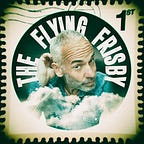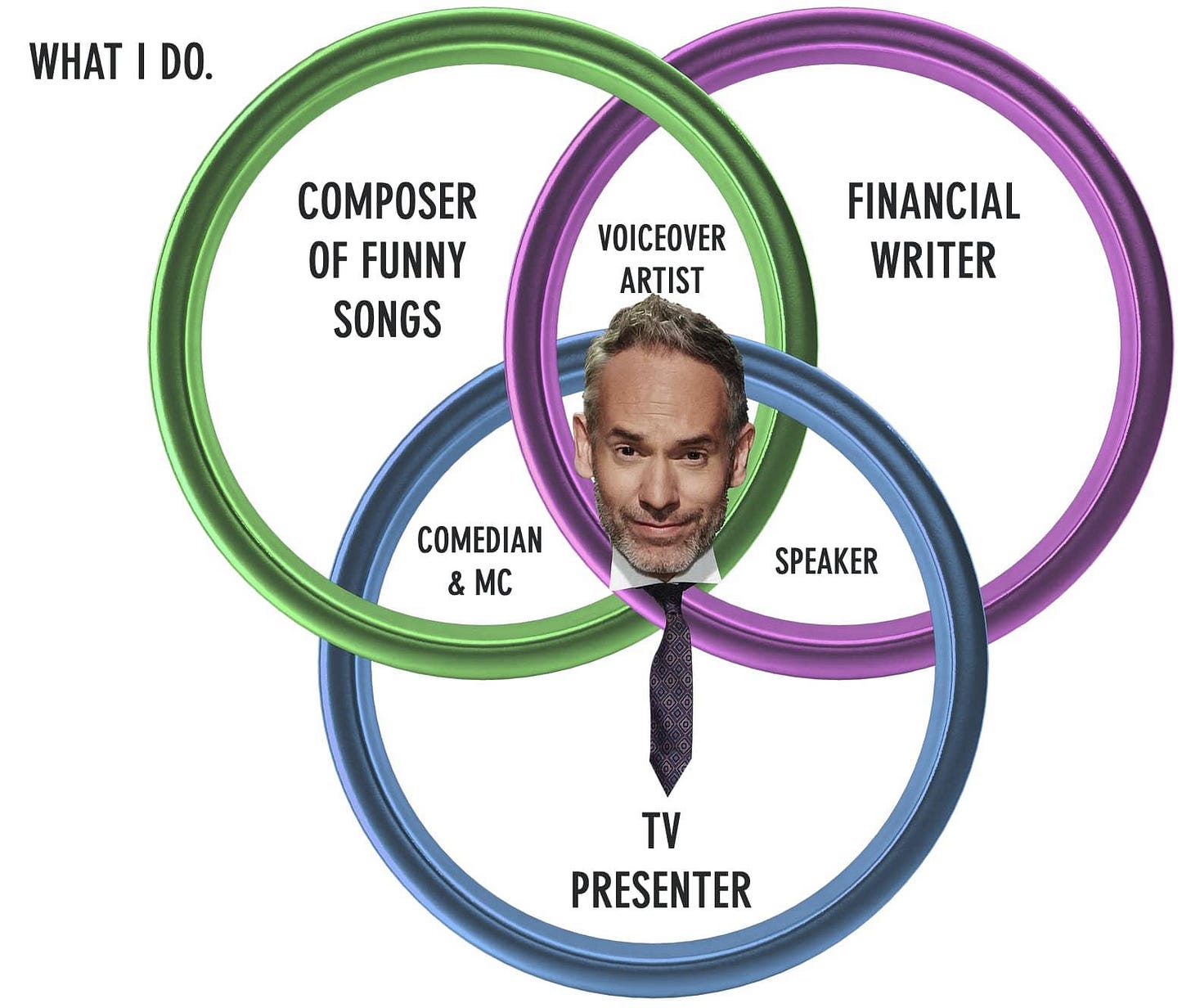Jonathan Johnson, from recruitment company, Auxato, got in touch and asked me to write a piece for him, explaining how it is I got from being stand-up comic and voice actor to a renowned (his words) longstanding, financial writer for Money Week. I thought readers would like it and he kindly gave me permission to republish it here. The questions are Jonathan’s.
Stand-up comedy – what life skills did it teach you?
Stand-up comedy teaches you lots of things. How to stand on stage in front of a bunch of strangers. How to present yourself. How to entertain people. How to cope with pressure. How to deal with difficult situations and difficult people. How to think on your feet. Communication. Clarity.
These are all really useful life skills that you might call upon in any number of other situations. Everyone should go and be a stand-up for a bit.
But there is a lot more to being a stand-up than what you see on stage. Behind the scenes, every comic is running a small business. Every day you are trying to get gigs. You’re sending out emails, making phone calls, posting on social media, all with the aim of pushing your brand, getting noticed and getting better work.
You’re running a diary. You’re invoicing for the gigs you have done. You’re chasing money from slow payers, while trying to extract money from the unsavoury promoters who are trying to wriggle out of paying you at all.
You are travelling up and down the country four, five, sometimes seven nights a week to places you have probably only ever heard of, meeting all sorts of different people. As a result comics often know the country as well as anyone - all the while trying to keep costs down so that you can exit the gig at a profit.
On top of all of that, but most fundamental of all, you have got to write an act that people find funny.
You learn so many skills doing comedy. Even if you are not destined for stardom, which most of us aren’t, the discipline still equips you for life. You just need to look at the many people who started out as comedians who have since gone on to achieve huge success in other fields, from Joe Rogan to Volodymyr Zelensky, to know there must be something in it.
Yet, if you’re a potential employer looking at someone’s CV and you see the word comedian, I bet that makes you less likely, rather than more likely, to call them in for an interview.
In fact, most comedians who decide they’ve done it for long enough and now want to try something else, find it near impossible to find employment because of the fact they have comedian on their CV. The only option for most is to set up another business.
What a random hotchpotch of a career you have. How did it happen?
I’m now 53. The longest I’ve ever lasted in a “proper” job is three months. This was back in 1992, when I was 23. I used to get up every morning, get the tube into Leicester Square and then do 10am to 6.30pm in an office. I hated it. It was not that bad a job either, but I hated being stuck in an office all day with no fresh air and not owning my own time.
That’s not to say I’m not hard-working. I’m extremely hard-working. You just need to look at my output to see that.
I would spend the next 15 years working occasionally as an actor, regularly as a voiceover (for some reason I always got more voiceover work than acting) and then, from 1997, as a comedian. All the while, I was trying to get stuff published - I wrote two novels and a million articles - but never with any success. I think I got one article in the Big Issue.
But by 2006, I had made a bit of money, some in property (by accident) and some from voiceovers: I had been, at various points, the voice of such eminent products as First Direct, Nintendo 64 and the National Lottery. My dad had made a bit of money, too. Between us, we were trying to figure out how to turn our bit of money into a lot of money; because we were trying to raise five million quid to bring Kisses on a Postcard into the West End.
From what I was reading at the time, commodities and gold, especially, seemed to be the place to invest, particularly with all the growth that was taking place in China. There were all sorts of people talking about it. But how to meet them and talk to them, without having to pay them? A podcast …
What gave you the inspiration for the podcast interviews?
I always knew I’d be a good presenter, even though I’d never actually done it. I was good at hosting comedy clubs and other such stuff. I approached a mining PR company called Commodity Watch and suggested we start a podcast. They didn’t really understand what I was talking about, so I did it anyway and began interviewing all these various people I’d heard on the internet talking so wisely about stuff.
My very first interview was with the billionaire, Jim Rogers, who had run the Quantum Fund with George Soros. My next two were with noted silver analyst, David Morgan, and the gold expert, James Turk.
I quickly learnt that you could secure interviews with people “above your station” quite easily, if they have something to promote, such as a book. A lot of the time people are happy to help out, even if they don’t have something to promote. To my surprise, there were far fewer walled gardens in the worlds of investment and commodities than in comedy and TV. People were much more open.
What brought about the job at Moneyweek?
One of the people I interviewed was Merryn Somerset Webb who, at the time, was editor at Money Week. “We need people like you to come and write for us,” she said. “Come into the office next week and meet Toby, the MD.”
So I did. Here I am, 17 years later and I am still writing the same weekly column, a column that has been popular and, in terms of longevity at least, successful. I’ve since published three books with a fourth on the way. I’ve written several documentaries, one of which was a huge internet sensation (even if I was never properly credited) and more besides. I think it’s fair to say that partnership with Moneyweek has worked - for them and me.
But if I had sent my CV in to Merryn, all she would have seen was stand-up comedian, voiceover artist, occasional actor, Johnny-come-lately podcast host and unpublished novelist. I don’t think she would for a second have gone, “I need to get this bloke writing for us.” Pretty much any employer would have looked at my CV and passed it by.
I now have this ridiculously random hotchpotch career that I can’t begin to explain. I’m a financial writer, comedian, singer-songwriter, comedy music video maker, TV presenter and voiceover artist. A very nice chap who works in internet marketing and likes my output - but despairs at its lack of clarity - with whom I correspond frequently, put this graphic together to try and explain what I do.
What can we learn from that episode with Merryn?
Two things. One, I don’t believe there is any substitute for face-to-face meetings. Meeting someone in the flesh inspires trust in a way that not a million emails can.
(That, by the way, is, I think, why I never had stuff published. I just sent it in. I’m not even sure it got read. It’s much easier to ignore a letter or an email than someone in person).
Often it works in reverse too. You really admire someone online for whatever it is they’ve written or said, but then you meet them in person and realise this is not the type of person you should be listening too.
Second, when you meet someone through the medium of an interview for a podcast, rather than just a meeting, it’s like a heightened encounter. You get through so much more in an hour than you otherwise would.
Get to know anyone who hosts a regular podcast and you will see they are total mavens. How many people do Joe Rogan, Konstantin Kisin or Steven Bartlett know as a result of their podcasts? How powerful are their networks? They are super connected - and trusted. Any introductions they make will carry weight.
As it turns out, stand-up comedy was the ideal training ground for being a financial writer. In comedy, if the audience doesn’t understand you, they don’t laugh. If they don’t laugh, you die. Thus does the comedian quickly learn the vital discipline of clarity.
You also learn that you have to entertain people if you want to keep their attention.
No such discipline exists in the world of financial journalism. Obfuscation is everywhere. It almost pays to be obfuscatory because then you can say, “Oh I didn’t mean that, I meant this.”
Some of the broadsheet journalists - guys who regularly win Finance Journalist of the Year or whatever - are as dull as ditch water and about as clear. Half the time, you have no idea what it is they are droning on about. I barely make it past the first paragraph.
But do you know what? They probably got the job because their CV was right.
Other stuff:
West Eng gig alert!
This May, wearing my comedy hat, I’ll be coming back to Crazy Coqs in Brasserie Zedel for another night of “curious comedy songs”. That’s this May 7th. Please come if you’re in town. They are super nights.
AI and the Future
I recorded this 90-minute interview about AI the other day with Andy - super interesting - and it’s now available to free subscribers:
Gold
Interested in protecting your wealth in these extraordinary times? Then be sure to own some gold bullion. My current recommended bullion dealer is The Pure Gold Company, whether you are taking delivery or storing online. Premiums are low, quality of service is high. You can deal with a human being. I have an affiliation deals with them.
Here is some more info about Auxato: At Auxato, we don’t just rely on your CV to get to know you. A key aspect of our approach to recruitment for our clients and candidates is the importance of building a long term relationship, learning about those skills that don’t make it onto a CV. Want to experience a different recruitment way? Get in touch with us today and start your journey.















